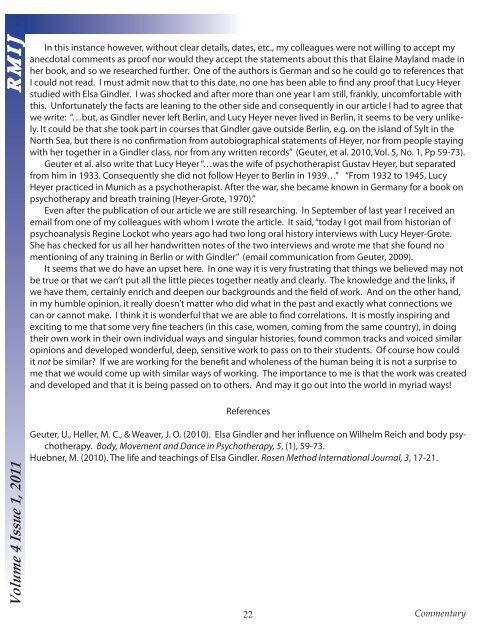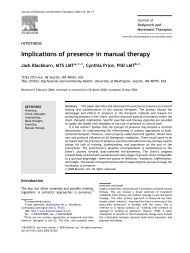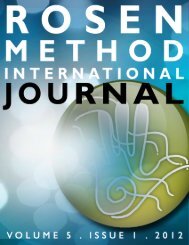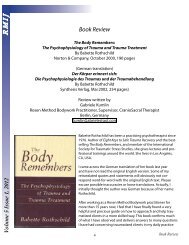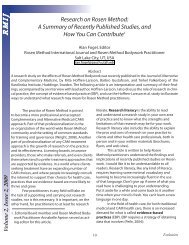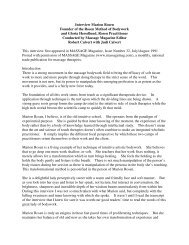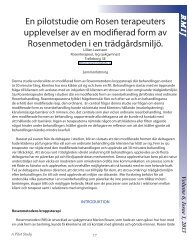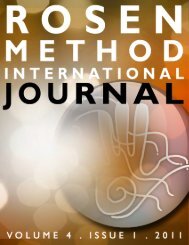The Life and Teachings of Elsa Gindler. - Rosen Journal
The Life and Teachings of Elsa Gindler. - Rosen Journal
The Life and Teachings of Elsa Gindler. - Rosen Journal
You also want an ePaper? Increase the reach of your titles
YUMPU automatically turns print PDFs into web optimized ePapers that Google loves.
R M I J . . .<br />
Volume 4 Issue 1, 2011<br />
In this instance however, without clear details, dates, etc., my colleagues were not willing to accept my<br />
anecdotal comments as pro<strong>of</strong> nor would they accept the statements about this that Elaine Mayl<strong>and</strong> made in<br />
her book, <strong>and</strong> so we researched further. One <strong>of</strong> the authors is German <strong>and</strong> so he could go to references that<br />
I could not read. I must admit now that to this date, no one has been able to find any pro<strong>of</strong> that Lucy Heyer<br />
studied with <strong>Elsa</strong> <strong>Gindler</strong>. I was shocked <strong>and</strong> after more than one year I am still, frankly, uncomfortable with<br />
this. Unfortunately the facts are leaning to the other side <strong>and</strong> consequently in our article I had to agree that<br />
we write: “…but, as <strong>Gindler</strong> never left Berlin, <strong>and</strong> Lucy Heyer never lived in Berlin, it seems to be very unlikely.<br />
It could be that she took part in courses that <strong>Gindler</strong> gave outside Berlin, e.g. on the isl<strong>and</strong> <strong>of</strong> Sylt in the<br />
North Sea, but there is no confirmation from autobiographical statements <strong>of</strong> Heyer, nor from people staying<br />
with her together in a <strong>Gindler</strong> class, nor from any written records” (Geuter, et al. 2010, Vol. 5, No. 1, Pp 59-73).<br />
Geuter et al. also write that Lucy Heyer “…was the wife <strong>of</strong> psychotherapist Gustav Heyer, but separated<br />
from him in 1933. Consequently she did not follow Heyer to Berlin in 1939…” “From 1932 to 1945, Lucy<br />
Heyer practiced in Munich as a psychotherapist. After the war, she became known in Germany for a book on<br />
psychotherapy <strong>and</strong> breath training (Heyer-Grote, 1970).”<br />
Even after the publication <strong>of</strong> our article we are still researching. In September <strong>of</strong> last year I received an<br />
email from one <strong>of</strong> my colleagues with whom I wrote the article. It said, “today I got mail from historian <strong>of</strong><br />
psychoanalysis Regine Lockot who years ago had two long oral history interviews with Lucy Heyer-Grote.<br />
She has checked for us all her h<strong>and</strong>written notes <strong>of</strong> the two interviews <strong>and</strong> wrote me that she found no<br />
mentioning <strong>of</strong> any training in Berlin or with <strong>Gindler</strong>” (email communication from Geuter, 2009).<br />
It seems that we do have an upset here. In one way it is very frustrating that things we believed may not<br />
be true or that we can’t put all the little pieces together neatly <strong>and</strong> clearly. <strong>The</strong> knowledge <strong>and</strong> the links, if<br />
we have them, certainly enrich <strong>and</strong> deepen our backgrounds <strong>and</strong> the field <strong>of</strong> work. And on the other h<strong>and</strong>,<br />
in my humble opinion, it really doesn’t matter who did what in the past <strong>and</strong> exactly what connections we<br />
can or cannot make. I think it is wonderful that we are able to find correlations. It is mostly inspiring <strong>and</strong><br />
exciting to me that some very fine teachers (in this case, women, coming from the same country), in doing<br />
their own work in their own individual ways <strong>and</strong> singular histories, found common tracks <strong>and</strong> voiced similar<br />
opinions <strong>and</strong> developed wonderful, deep, sensitive work to pass on to their students. Of course how could<br />
it not be similar? If we are working for the benefit <strong>and</strong> wholeness <strong>of</strong> the human being it is not a surprise to<br />
me that we would come up with similar ways <strong>of</strong> working. <strong>The</strong> importance to me is that the work was created<br />
<strong>and</strong> developed <strong>and</strong> that it is being passed on to others. And may it go out into the world in myriad ways!<br />
References<br />
Geuter, U., Heller, M. C., & Weaver, J. O. (2010). <strong>Elsa</strong> <strong>Gindler</strong> <strong>and</strong> her influence on Wilhelm Reich <strong>and</strong> body psychotherapy.<br />
Body, Movement <strong>and</strong> Dance in Psychotherapy, 5, (1), 59-73.<br />
Huebner, M. (2010). <strong>The</strong> life <strong>and</strong> teachings <strong>of</strong> <strong>Elsa</strong> <strong>Gindler</strong>. <strong>Rosen</strong> Method International <strong>Journal</strong>, 3, 17-21.<br />
22<br />
Commentary


